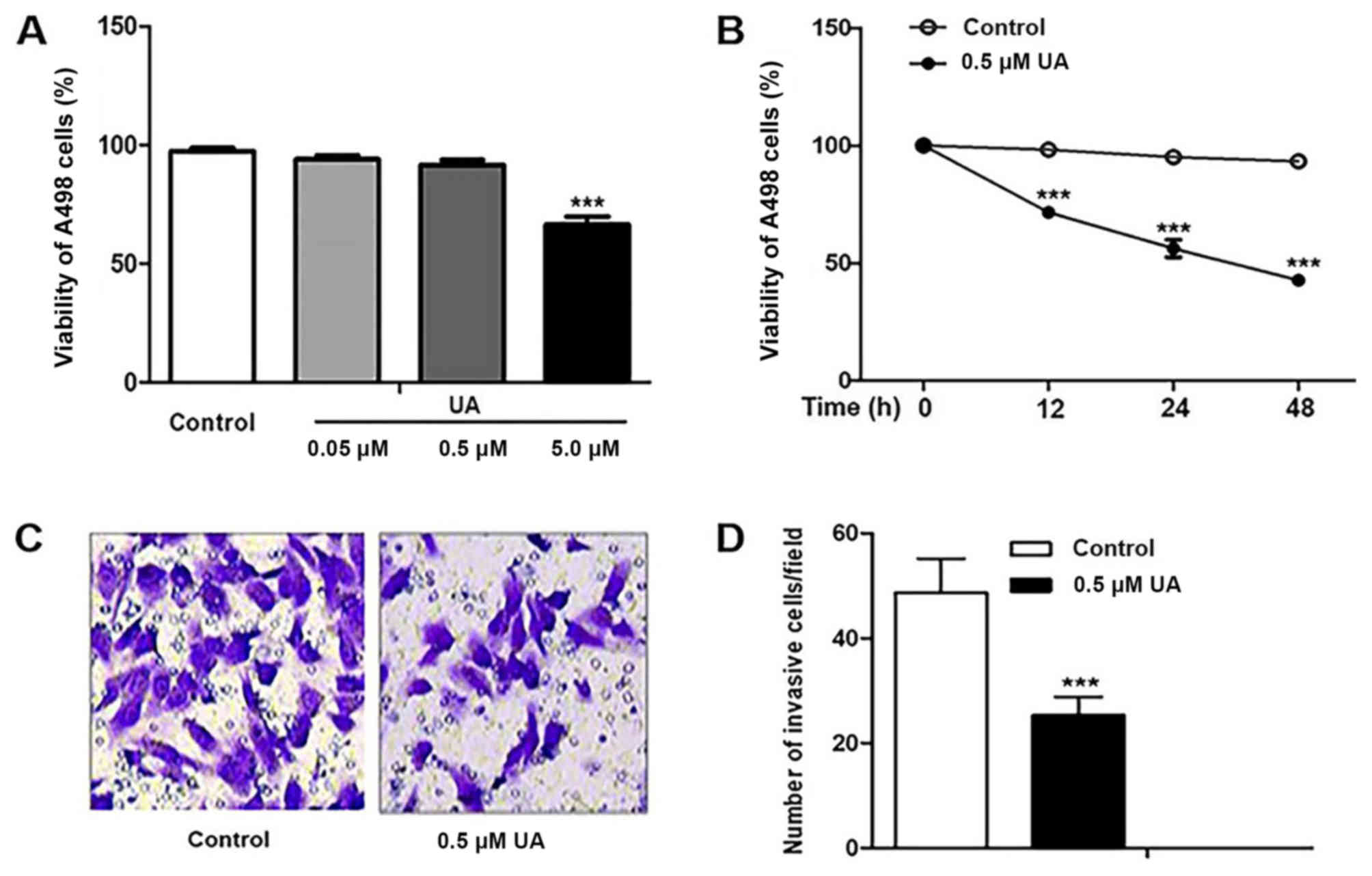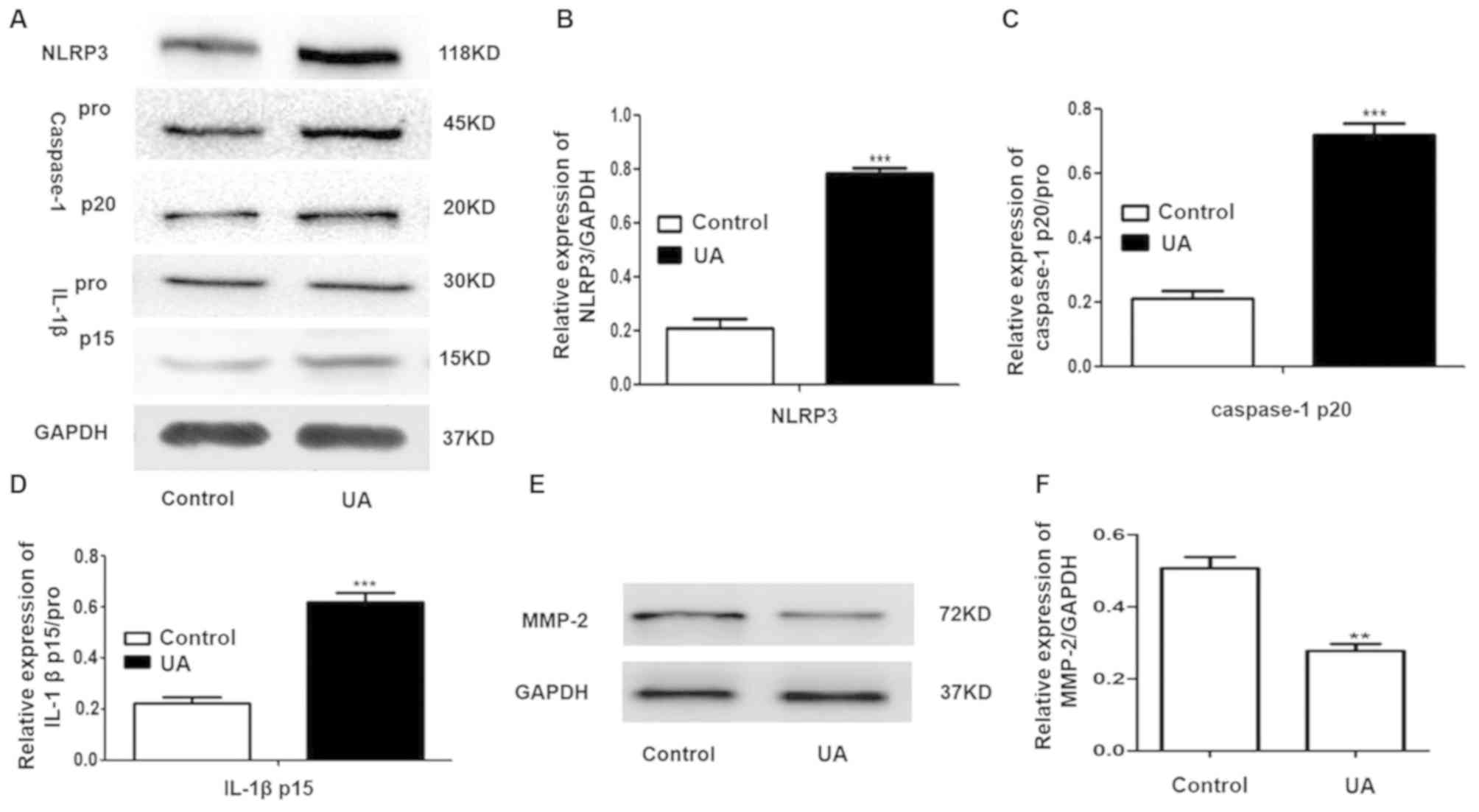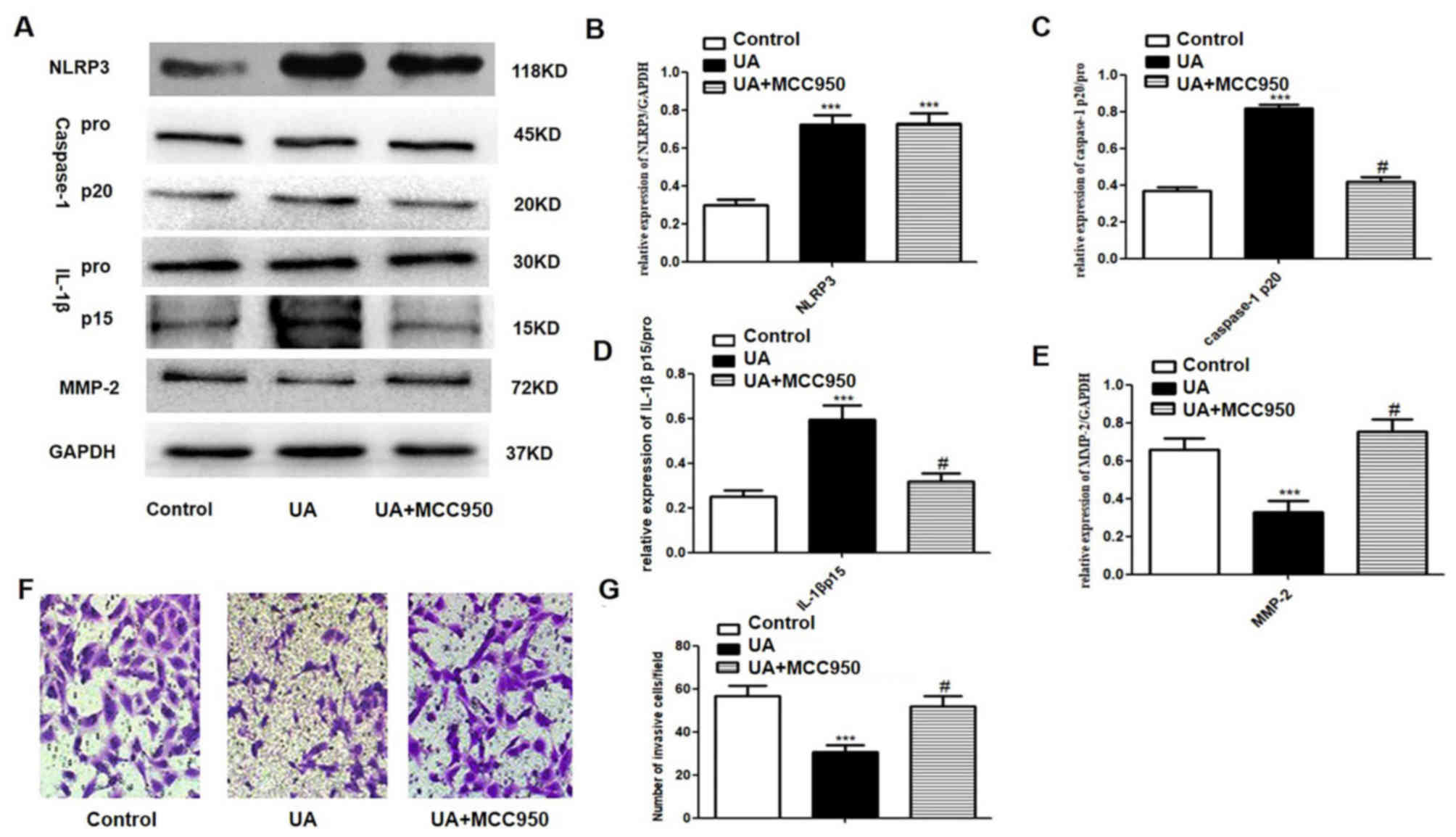|
1
|
Capitanio U, Bensalah K, Bex A, Boorjian
SA, Bray F, Coleman J, Gore JL, Sun M, Wood C and Russo P:
Epidemiology of renal cell carcinoma. Eur Urol. 75:74–84. 2019.
View Article : Google Scholar : PubMed/NCBI
|
|
2
|
Xiao QC, Zhu WS, Feng W, Lee SS, Leung AW,
Shen J, Gao L and Xu C: A Review of resveratrol as a potent
chemoprotective and synergistic agent in cancer chemotherapy. Front
Pharmacol. 9:15342019. View Article : Google Scholar : PubMed/NCBI
|
|
3
|
Traore-Coulibaly M, Ziegler HL, Olsen CE,
Hassanata MK, Pierre GI, Nacoulma OG, Guiguemdé TR and Christensen
SB: 19alpha-Hydroxy-3-oxo-ursa-1,12-dien-28-oic acid, an
antiplasmodial triterpenoid isolated from Canthium multiflorum. Nat
Prod Res. 23:1108–1111. 2009. View Article : Google Scholar : PubMed/NCBI
|
|
4
|
Kim SH, Ryu HG, Lee J, Shin J, Harikishore
A, Jung HY, Kim YS, Lyu HN, Oh E, Baek NI, et al: Ursolic acid
exerts anti-cancer activity by suppressing vaccinia-related kinase
1-mediated damage repair in lung cancer cells. Sci Rep.
5:145702015. View Article : Google Scholar : PubMed/NCBI
|
|
5
|
Tang Q, Liu Y, Li T, Yang X, Zheng G, Chen
H, Jia L and Shao J: A novel co-drug of aspirin and ursolic acid
interrupts adhesion, invasion and migration of cancer cells to
vascular endothelium via regulating EMT and EGFR-mediated signaling
pathways: Multiple targets for cancer metastasis prevention and
treatment. Oncotarget. 7:73114–73129. 2016. View Article : Google Scholar : PubMed/NCBI
|
|
6
|
Dong H, Yang X, Xie J, Xiang L, Li Y, Ou
M, Chi T, Liu Z, Yu S, Gao Y, et al: UP12, a novel ursolic acid
derivative with potential for targeting multiple signaling pathways
in hepatocellular carcinoma. Biochem Pharmacol. 93:151–162. 2015.
View Article : Google Scholar : PubMed/NCBI
|
|
7
|
Kim ES and Moon A: Ursolic acid inhibits
the invasive phenotype of SNU-484 human gastric cancer cells. Oncol
Lett. 9:897–902. 2015. View Article : Google Scholar : PubMed/NCBI
|
|
8
|
Nam H and Kim MM: Ursolic acid induces
apoptosis of SW480 cells via p53 activation. Food Chem Toxicol.
62:579–583. 2013. View Article : Google Scholar : PubMed/NCBI
|
|
9
|
Ruan JS, Zhou H, Yang L, Wang L, Jiang ZS,
Sun H and Wang SM: Ursolic acid attenuates TGF-β1-induced
epithelial-mesenchymal transition in NSCLC by targeting integrin
αVβ5/MMPs signaling. Oncol Res. 27:593–600. 2019. View Article : Google Scholar : PubMed/NCBI
|
|
10
|
Wang S, Meng X and Dong Y: Ursolic acid
nanoparticles inhibit cervical cancer growth in vitro and
in vivo via apoptosis induction. Int J Oncol. 50:1330–1340.
2017. View Article : Google Scholar : PubMed/NCBI
|
|
11
|
Pei Y, Zhang Y, Zheng K, Shang G, Wang Y,
Wang W, Qiu E and Zhang X: Ursolic acid suppresses the biological
function of osteosarcoma cells. Oncol Lett. 18:2628–2638.
2019.PubMed/NCBI
|
|
12
|
Sohn EJ, Won G, Lee J, Yoon SW, Lee I, Kim
HJ and Kim SH: Blockage of epithelial to mesenchymal transition and
upregulation of let 7b are critically involved in ursolic acid
induced apoptosis in malignant mesothelioma cell. Int J Biol Sci.
12:1279–1288. 2016. View Article : Google Scholar : PubMed/NCBI
|
|
13
|
Sun L, Ma W, Gao W, Xing Y, Chen L, Xia Z,
Zhang Z and Dai Z: Propofol directly induces caspase-1-dependent
macrophage pyroptosis through the NLRP3-ASC inflammasome. Cell
Death Dis. 10:5422019. View Article : Google Scholar : PubMed/NCBI
|
|
14
|
Shao BZ, Wang SL, Pan P, Yao J, Wu K, Li
ZS, Bai Y and Linghu EQ: Targeting NLRP3 Inflammasome in
inflammatory bowel disease: Putting out the fire of inflammation.
Inflammation. 42:1147–1159. 2019. View Article : Google Scholar : PubMed/NCBI
|
|
15
|
Deng Q, Geng Y, Zhao L, Li R, Zhang Z, Li
K, Liang R, Shao X, Huang M, Zuo D, et al: NLRP3 inflammasomes in
macrophages drive colorectal cancer metastasis to the liver. Cancer
Lett. 442:21–30. 2019. View Article : Google Scholar : PubMed/NCBI
|
|
16
|
Wang Y, Kong H, Zeng X, Liu W, Wang Z, Yan
X, Wang H and Xie W: Activation of NLRP3 inflammasome enhances the
proliferation and migration of A549 lung cancer cells. Oncol Rep.
35:2053–2064. 2016. View Article : Google Scholar : PubMed/NCBI
|
|
17
|
Wang K, Xu T, Ruan H, Xiao H, Liu J, Song
Z, Cao Q, Bao L, Liu D, Wang C, et al: LXRα promotes cell
metastasis by regulating the NLRP3 inflammasome in renal cell
carcinoma. Cell Death Dis. 10:1592019. View Article : Google Scholar : PubMed/NCBI
|
|
18
|
Conos SA, Lawlor KE, Vaux DL, Vince JE and
Lindqvist LM: Cell death is not essential for caspase-1-mediated
interleukin-1 beta activation and secretion. Cell Death Differ.
23:1827–1838. 2016. View Article : Google Scholar : PubMed/NCBI
|
|
19
|
Huang CF, Chen L, Li YC, Wu L, Yu GT,
Zhang WF and Sun ZJ: NLRP3 inflammasome activation promotes
inflammation-induced carcinogenesis in head and neck squamous cell
carcinoma. J Exp Clin Canc Res. 36:1162017. View Article : Google Scholar
|
|
20
|
Xavier CP, Lima CF, Preto A, Seruca R,
Fernandes-Ferreira M and Pereira-Wilson C: Luteolin, quercetin and
ursolic acid are potent inhibitors of proliferation and inducers of
apoptosis in both KRAS and BRAF mutated human colorectal cancer
cells. Cancer Lett. 281:162–170. 2009. View Article : Google Scholar : PubMed/NCBI
|
|
21
|
Zhang RX, Li Y, Tian DD, Liu Y, Nian W,
Zou X, Chen QZ, Zhou LY, Deng ZL and He BC: Ursolic acid inhibits
proliferation and induces apoptosis by inactivating Wnt/β-catenin
signaling in human osteosarcoma cells. Int J Oncol. 49:1973–1982.
2016. View Article : Google Scholar : PubMed/NCBI
|
|
22
|
Li W, Zhang HX, Nie MX, Tian YL, Chen X,
Chen C, Chen H and Liu R: Ursolic acid derivative FZU-03,010
inhibits STAT3 and induces cell cycle arrest and apoptosis in renal
and breast cancer cells. Acta Biochim Biophys Sin (Shanghai).
49:367–373. 2017. View Article : Google Scholar : PubMed/NCBI
|
|
23
|
Lipworth L, Tarone RE, Lund L and
McLaughlin JK: Epidemiologic characteristics and risk factors for
renal cell cancer. Clin Epidemiol. 1:33–43. 2009.PubMed/NCBI
|
|
24
|
Yang KW, Xiong GY, Li XS, Tang Y, Tang Q,
Zhang CJ, He ZS and Zhou LQ: Prevalence of baseline chronic kidney
disease in 2,769 Chinese patients with renal cancer:
Nephron-sparing treatment is still underutilized. World J Urol.
32:1027–1031. 2014. View Article : Google Scholar : PubMed/NCBI
|
|
25
|
Capitanio U and Montorsi F: Renal cancer.
Lancet. 387:894–906. 2016. View Article : Google Scholar : PubMed/NCBI
|
|
26
|
Kessenbrock K, Plaks V and Werb Z: Matrix
metalloproteinases: Regulators of the tumor microenvironment. Cell.
141:52–67. 2010. View Article : Google Scholar : PubMed/NCBI
|
|
27
|
Sandri S, Faiao-Flores F, Tiago M,
Pennacchi PC, Massaro RR, Alves-Fernandes DK, Berardinelli GN,
Evangelista AF, de Lima Vazquez V, Reis RM and Maria-Engler SS:
Vemurafenib resistance increases melanoma invasiveness and
modulates the tumor microenvironment by MMP-2 upregulation.
Pharmacol Res. 111:523–533. 2016. View Article : Google Scholar : PubMed/NCBI
|
|
28
|
Zaki MH, Vogel P, Body-Malapel M, Lamkanfi
M and Kanneganti TD: IL-18 production downstream of the Nlrp3
inflammasome confers protection against colorectal tumor formation.
J Immunol. 185:4912–4920. 2010. View Article : Google Scholar : PubMed/NCBI
|
|
29
|
Lee HE and Lee JY, Yang G, Kang HC, Cho
YY, Lee HS and Lee JY: Inhibition of NLRP3 inflammasome in tumor
microenvironment leads to suppression of metastatic potential of
cancer cells. Sci Rep. 9:122772019. View Article : Google Scholar : PubMed/NCBI
|
|
30
|
Davis BK, Wen HT and Ting JP: The
inflammasome NLRs in immunity, inflammation, and associated
diseases. Annu Rev Immunol. 29:707–735. 2011. View Article : Google Scholar : PubMed/NCBI
|
|
31
|
Coll RC, Hill JR, Day CJ, Zamoshnikova A,
Boucher D, Massey NL, Chitty JL, Fraser JA, Jennings MP, Robertson
AAB and Schroder K: MCC950 directly targets the NLRP3
ATP-hydrolysis motif for inflammasome inhibition. Nat Chem Biol.
15:556–559. 2019. View Article : Google Scholar : PubMed/NCBI
|
|
32
|
Chen SP, Zhou YQ, Wang XM, Sun J, Cao F,
HaiSam S, Ye DW and Tian YK: Pharmacological inhibition of the
NLRP3 inflammasome as a potential target for cancer-induced bone
pain. Pharmacol Res. 147:1043392019. View Article : Google Scholar : PubMed/NCBI
|

















